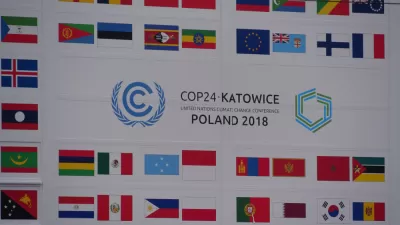October 5 was an historic day, hailed President Obama, as nations responsible for emitting more than 55 percent of world carbon emissions have now signed the Paris climate agreement, the threshold needed for the accord to take effect in 30 days.

"Germany, France, Austria, Hungary, Slovakia and Malta - European Union nations which have completed domestic ratification and account for about four percent of emissions - formally signed up on Wednesday," report
By contrast, it took eight years for the previous U.N. climate deal, the 1997 Kyoto Protocol, to gain enough backing to take effect. It obliged only rich nations to cut emissions and the United States stayed out of it.
On Oct. 2, "India, the planet’s fourth-largest emitter of greenhouse gases, formally joined the accord," reported Chris Mooney and Brady Dennis for The Washington Post.
"China represents just over 20 percent of global emissions while the United States accounting for 17.9 percent, Russia 7.5 percent and India 4.1 percent," notes an earlier Reuters article.
As of Oct. 6, Signatories: 191. Parties: 74 parties of the 191 signatories have ratified or approved the agreement according to the United Nations Framework Convention on Climate Change tracker.
President Obama called Wednesday a "turning point for our planet" in this short video.
Doyle reports on Oct. 3 that the real test will be enforcement.
"The key question will be implementing the agreement. There's no legal enforcement of pledges," said Robert Watson, a British-American scientist and former head of the U.N.'s panel of climate experts.
Under the Paris Agreement, almost 200 states have set their own national targets for emissions, with five-yearly national reviews and promises to set ever tougher goals.
The Paris Agreement aims to limit a rise in world temperatures to "well below" 2 degrees Celsius (3.6 Fahrenheit) above those in pre-industrial times. The United Nations says current pledges are too weak to reach that goal.
On Sept. 29, Doyle reported that scientists warned that "[g]lobal warming is on track to breach a 2 degrees Celsius threshold by 2050 unless governments at least double their efforts to limit greenhouse gas emissions."
"The Agreement will now enter into force in time for the Climate Conference (COP 22) in [Marrakesh] Morocco in November, where countries will convene the first Meeting of the Parties to the Agreement," according to the UN News Centre.
Related on Planetizen:
-
Paris Climate Agreement Signed, but Troubles Loom in the U.S., April 23, 2016
- Big News From Paris: A New International Climate Accord, December 13, 2015
FULL STORY: Paris climate accord to take effect; Obama hails 'historic day'

Planetizen Federal Action Tracker
A weekly monitor of how Trump’s orders and actions are impacting planners and planning in America.

Maui's Vacation Rental Debate Turns Ugly
Verbal attacks, misinformation campaigns and fistfights plague a high-stakes debate to convert thousands of vacation rentals into long-term housing.

Restaurant Patios Were a Pandemic Win — Why Were They so Hard to Keep?
Social distancing requirements and changes in travel patterns prompted cities to pilot new uses for street and sidewalk space. Then it got complicated.

In California Battle of Housing vs. Environment, Housing Just Won
A new state law significantly limits the power of CEQA, an environmental review law that served as a powerful tool for blocking new development.

Boulder Eliminates Parking Minimums Citywide
Officials estimate the cost of building a single underground parking space at up to $100,000.

Orange County, Florida Adopts Largest US “Sprawl Repair” Code
The ‘Orange Code’ seeks to rectify decades of sprawl-inducing, car-oriented development.
Urban Design for Planners 1: Software Tools
This six-course series explores essential urban design concepts using open source software and equips planners with the tools they need to participate fully in the urban design process.
Planning for Universal Design
Learn the tools for implementing Universal Design in planning regulations.
Heyer Gruel & Associates PA
JM Goldson LLC
Custer County Colorado
City of Camden Redevelopment Agency
City of Astoria
Transportation Research & Education Center (TREC) at Portland State University
Jefferson Parish Government
Camden Redevelopment Agency
City of Claremont





























